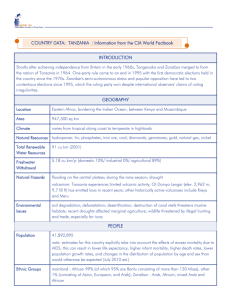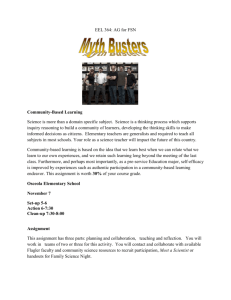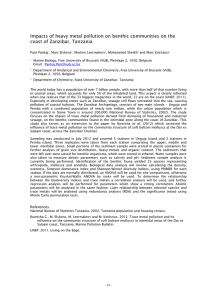P F S
advertisement
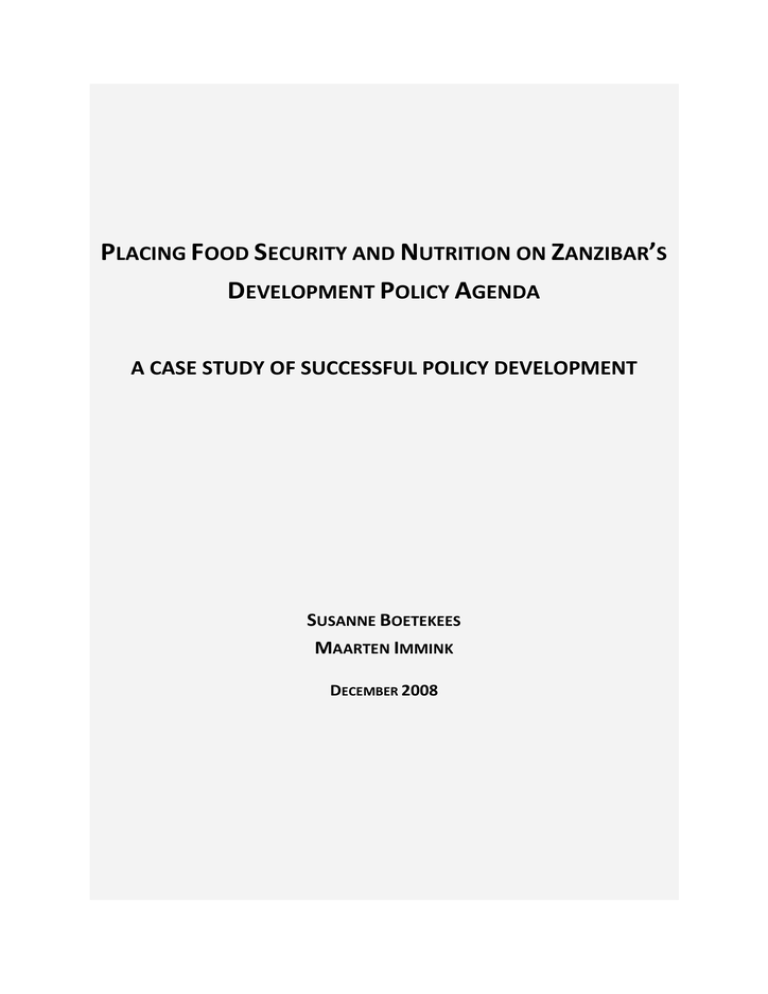
PLACING FOOD SECURITY AND NUTRITION ON ZANZIBAR’S DEVELOPMENT POLICY AGENDA A CASE STUDY OF SUCCESSFUL POLICY DEVELOPMENT SUSANNE BOETEKEES MAARTEN IMMINK DECEMBER 2008 Table of Contents Abbreviations ...........................................................................................................................................ii 1. Introduction.................................................................................................................................... 3 2. Mainstreaming food security and nutrition in an overarching policy framework ......................... 4 The formulation process ............................................................................................................... 4 Outcomes and lessons learned ..................................................................................................... 6 3. Formulating a multi-sectoral policy framework and programme .................................................. 7 The formulation process ............................................................................................................... 7 Outcomes and lessons learned ..................................................................................................... 8 4. Towards implementation ............................................................................................................. 10 Capacity-strengthening process.................................................................................................. 10 Outcomes and lessons learned ................................................................................................... 11 5. Main findings and lessons for Zanzibar ........................................................................................ 12 Technical quality of the policy assistance ................................................................................... 12 Relevance and intensity of the policy assistance ........................................................................ 13 National capacity strengthening................................................................................................. 13 Creating national ownership....................................................................................................... 14 Conclusions for policy assistance to effectively mainstream food security and nutrition .......... 14 Annex 1 Institutions represented in the ZSGRP drafting team ..................................................... 17 Annex 2 ZFSNP&P formulation team............................................................................................. 17 Annex 3 References ....................................................................................................................... 17 i Abbreviations ANGOZA CMO CSO FAO FNPP FNPP-FS FSN HIV/AIDS HR ISSC MALE MDG MKUZA MLYWCD MOEVT MOFEA MoHSW MPs MS(PO)CAGG MS(PO)RASD MWCEL OCGS RGoZ RtF SUZA UNDAF UNDP UNFPA UNICEF WEHAB WFP WSSD ZAC ZFSNP&P ZFSNSA ZNCCIA ZPRP ZSGRP Association of Non Governmental Organisations in Zanzibar Chief Minister’s Office Civil Society Organization Food and Agriculture Organization of the United Nations FAO Netherlands Partnership Programme FAO Netherlands Partnership Programme - Food Security component Food security and nutrition Human Immune Deficiency Virus / Acquired Immune Deficiency Syndrome Human rights Inter Sectoral Steering Committee Ministry of Agriculture, Livestock and Environment Millennium Development Goal Mkakati wa Kukuza Uchumi na Kupunguza Umaskini Zanzibar Ministry of Labour, Youth, Women and Children Development Ministry of Education and Vocational Training Ministry of Finance and Economic Affairs Ministry of Health and Social Welfare Members of Parliament Ministry of State (President’s Office) Constitutional Affairs and Good Governance Ministry of State (President’s Office) Regional Administration and Special Departments Ministry of Water, Construction, Energy and Land Office of the Chief Government Statistician Revolutionary Government of Zanzibar Right to food State University of Zanzibar United Nations Development Assistance Framework United Nation Development Programme United Nations Fund for Population Activities United Nations Children’s Fund Water, Energy, Health, Agriculture and Biodiversity World Food Programme of the United Nations World Summit on Sustainable Development Zanzibar Aids Committee Zanzibar Food Security and Nutrition Policy and Programme Zanzibar Food Security and Nutrition Situational Analysis Zanzibar National Chamber of Commerce Industries and Agriculture Zanzibar Poverty Reduction Plan Zanzibar Strategy for Growth and Reduction of Poverty ii 1. Introduction Access to food in Zanzibar is one of the foremost food security problems for many Zanzibari households, both urban and rural. The inability of households to obtain an appropriate and nutritious diet throughout the year is a noted difficulty: about 49 percent of the Zanzibar population is considered poor, with 13 percent living below the food poverty line.1 Poor nutrition is evident by high prevalence of micronutrient deficiencies among women and children, and undernutrition in under-five children. Poverty is a major development challenge for Zanzibar, where a low resource base, few employment opportunities and lack of income-generating activities result in low household purchasing power. The situation is further aggravated by poor access to basic social services such as education, health, water and sanitation. Food insecurity, malnutrition and vulnerability are thus major issues in Zanzibar and important dimensions of poverty. Supported by the Government of the Netherlands, in 2004 FAO started a programme to contribute to the achievement of the Millennium Development Goals (MDGs), in particular MDG 1 and MDG 7, and the Plan of Action of the World Summit of Sustainable Development (WSSD).2 This FAO Netherlands Partnership Programme (FNPP) is a country-oriented programme with a triple thematic focus - Food Security, Forestry and Agro-biodiversity. The food security component focuses on helping countries mainstream food security and nutrition (FSN) issues into national planning processes, and to formulate and implement policy measures that reflect the need for multi-sector involvement in addressing food insecurity and malnutrition. In 2005, when the Revolutionary Government of Zanzibar began its review of the overarching policy framework for poverty reduction (the Zanzibar Poverty Reduction Paper (ZPRP)), FNPP represented an opportunity to assist Zanzibar with mainstreaming FSN aspects in the second generation of this framework, the Zanzibar Strategy for Growth and Reduction of Poverty (ZSGRP). FNPP could also help formulate better targeted and more effective national policies and programmes to address food insecurity, malnutrition and poverty. This paper discusses lessons learned from the policy assistance activities implemented with FNPP support in Zanzibar between late 2005 and mid 2008, which can be best described in three phases, each phase with its own process and outcomes but interlinked to those of the other phases. The process and outcomes of the first phase of the project - mainstreaming FSN into the ZSGRP - are described in section two of this paper. Section three describes the formulation of a national FSN policy and programme, representing the second phase of the project. The third phase - in which the focus began to centre on policy and programme implementation - will be discussed in section four. Section five presents a summary of main findings and lessons learned. 1 The food poverty line is the minimum spending per person needed to provide basic dietary requirements (recommended calorie intake) for one month, based on the foods consumed by the poorest 50 % of the population. The food poverty line measures the proportion of Zanzibar’s population with a per capita income of less than TShs 12,988 per month. Source: Zanzibar Food Security and Nutrition Situational Analysis, Revolutionary Government of Zanzibar, June 2006 2 During the Johannesburg World Summit on Sustainable Development (WSSD) five focus areas were proposed: Water, Energy, Health, Agriculture and Biodiversity (WEHAB) 3 2. Mainstreaming FSN in an overarching policy framework In February 2005 an FAO project identification mission to Tanzania took place, during which discussions indicated that the United Nations Development Assistance Framework (UNDAF) work plan included technical support to the formulation of the second-generation Zanzibar Poverty Reduction Plan - ZPRP II. Of particular concern were: i) non integration in ZPRP I of FSN concerns as key and cross-cutting poverty reduction issues; ii) lack of identification and characterization of foodinsecure and vulnerable population groups, in order to target poverty and food insecurity reduction measures; and iii) a monitoring and evaluation system that focused on inputs and outputs, rather than outcomes and impacts of poverty reduction measures, in line with national targets and goals. FAO signalled to the UNDAF Working Team in Tanzania that under the FAO Netherlands Partnership Programme (FNPP) technical and financial support could be provided for the formulation and implementation of the ZPRP II, effectively addressing the above concerns and others. Once the process of preparing the ZPRP II (later renamed as the Zanzibar Strategy for Growth and Reduction of Poverty - ZSGRP, also referred to as MKUZA3) got under way late 2005, FAO was invited by the Revolutionary Government of Zanzibar (RGoZ), through the Ministry of Agriculture, Livestock and Environment (MALE), to technically support the formulation of ZSGRP. Working closely with UN agencies and national counterparts, FAO was requested to help place FSN on the national poverty agenda and to ensure that goals and targets as set out in the new strategy adequately reflected FSN problems in Zanzibar, as well as their linkages to poverty. Thus, at the start of the policy assistance project, there was no clear “window of opportunity” for technical support to mainstream FSN into ZPRP II: the policy assistance project contributed significantly to creating the political will for FSN issues to be placed on the policy agenda and to be effectively integrated into the ZSGRP. Although over the last few years the RGoZ has placed increased emphasis on poverty reduction and the improvement of daily living conditions of the Zanzibar population, initial understanding by national decision makers and technical staff of FSN issues and their relation to poverty was poor. The policy assistance in Zanzibar started at a time when the process of reviewing ZPRP I to formulate the ZSGRP was ongoing. The UNDAF work plan for Zanzibar represented an opportune entry point for the policy assistance project to offer specialized technical support in the area of FSN. The ZSGRP presents an overarching policy framework, and FAO’s participation in the formulation process offered an opportunity to create awareness amongst a wide range of stakeholders of the multi-sector dimensions of FSN, their linkage to poverty and the need to establish policy priorities to address FSN problems in Zanzibar. The formulation process The Government of Zanzibar took a participatory approach in developing the ZSGRP, by opening up the process with extensive consultations to seek views from wide range of stakeholders. The design, 3 MKUZA is the Kiswahili acronym for ZSGRP, the full title being “Mkakati wa Kukuza Uchumi na Kupunguza Umaskini Zanzibar” 4 drafting, refinement and review of the document were carried out by a multi-disciplinary team (the drafting team) with representatives of key sectors of government, civil society, the private sector, academic institutions and development partners.4 FAO became a member of the ZSGRP drafting team, ensuring continuous, direct and adequate input for mainstreaming FSN into the ZSGRP. This approach proved to be very effective. It resulted in the inclusion of FSN priorities, goals and strategies in each of the three clusters of the ZSGRP, these being i) growth and reduction of income poverty, ii) social services and wellbeing, and iii) good governance and national unity. It soon became clear the policy assistance project needed to provide support in two areas in order to effectively mainstream FSN in the ZSGRP: i) educating public officials and other actors about FSN core concepts and issues in Zanzibar; and ii) conducting a comprehensive analysis of the FSN situation in Zanzibar, including an assessment of national policies and institutional arrangements relevant to FSN. A three-day training workshop was held for public officials from various ministries, public agencies and representatives of several non-governmental organizations (NGOs).5 The objective of the workshop was to strengthen the capacity of members of the ZSGRP drafting team and other relevant stakeholders, to mainstream food security, environment and land issues into the ZSGRP. The workshop provided a multi-sector approach to food security from the outset, as environmental and land issues are strongly linked to food security and poverty in Zanzibar. The Zanzibar Food Security and Nutrition Situational Analysis (ZFSNSA) was produced and published in June 2006. The study presents a comprehensive situational and causal analysis of existing food insecurity and nutrition problems in Zanzibar, using all available survey data and specific knowledge and expertise of staff, especially from MALE and the Ministry of Health and Social Welfare (MoHSW), but also from non-government agencies like the World Food Programme (WFP), UNICEF and Save the Children. In particular, household-level food insecurity status and vulnerability are identified and characterized for different livelihood groups. The analysis identifies the causes of household vulnerability to food insecurity and malnutrition problems that specific population groups face. The policy setting for food security is examined by reviewing relevant sector policies. The roles and mandates of several ministries and other government institutions are described with respect to FSN. Key policy areas that need to be addressed from sectoral and inter-sectoral perspectives are identified. One strong recommendation relates to the need for a comprehensive FSN policy framework. The situation analysis provides guidance for technical interventions as well as for institutional actions, including strengthening inter-institutional coordination. The drafting of the strategy was finalized and submitted to the Revolutionary Council of Ministers in 2006. The Zanzibar Strategy of Growth and Reduction of Poverty was officially endorsed by the House of Representatives in January 2007 and formally launched in March 2007. 4 See annex 1 for a complete list of institutions represented in the ZSGRP drafting team Stakeholder Training and Sensitization Workshop on “Mainstreaming Food Security, Environment and Land Management issues into the ZSGRP”, Zanzibar, 22-24 January 2006 5 5 Outcomes and lessons learned Food security is included in the ZSGRP as one of the cross-cutting issues (along with gender, HIV/AIDS and environment). The focus of the mainstreaming process was on incorporating a twin-track approach to food security, stressing the linkages between poverty reduction and reduced food insecurity and malnutrition, in terms of increasing domestic food production as well as improving food access through income generation among the food-insecure and poor and the promotion of targeted social protection programmes, including food safety nets. Clear operational goals and targets for FSN are included in the clusters of growth and reduction of income poverty, and social services and wellbeing. The cluster of good governance and national unity promotes the fulfilment of human rights, including the right to food, by inclusion of human rights principles of nondiscrimination, empowerment, accountability and full participation. This outcome is fully in line with the one originally planned: “the revised and approved Zanzibar Strategy for Growth and Reduction of Poverty, addressing broad FSN concerns as well as linkages between FSN and poverty reduction and development”. The systematic approach that the policy assistance project took in mainstreaming FSN in the ZSGRP consisted of continual and active participation as a full member of the drafting team from the start. This proved to be very instrumental in achieving this outcome. Unfortunately, the ZSGRP drafting team did not systematically use this approach for all cross-cutting issues, as is reflected by the various levels in which they are integrated in the strategy. Alternative mainstreaming modalities that were used during the formulation process, including ad hoc consultations from external consultants, yielded shallow outputs rather than strategies and interventions that reflect the Zanzibar situation. For the effective development of strategies and operational targets in a policy, it is crucial for a policy assistance team and the external consultants drawn into the policy assistance to have adequate experience in specific areas related to poverty reduction and development as well as a thorough understanding of the local situation. The highly participatory approach followed in Zanzibar resulted in the various institutions having an intimate knowledge of the contents of the ZSGRP, and significantly contributed to a broadened understanding of food insecurity, malnutrition and vulnerability as important dimensions of poverty. It also created a strong sense of national ownership of the ZSGRP. However, since many stakeholders were directly involved in the drafting and editing of the ZSGRP document, it was cumbersome to keep track of the contents of various versions and to ensure that FSN issues and matters remained correctly included in subsequent versions. Collaboration with other agencies, particularly WFP, UNICEF and Save the Children, in the implementation of activities organized under the policy assistance project in this phase greatly facilitated the sharing of experience and expertise and has particularly been important in the area of national capacity strengthening. Well sequenced policy assistance inputs are important. The consensus about the need to conduct a comprehensive causal analysis of FSN problems in Zanzibar was reached during the training 6 workshop on mainstreaming FSN in the ZSGRP. Although this need was perceived fairly early on in the policy assistance project, the formulation of the ZSGRP was well advanced by the time the results of the situation analysis were fully available. While the results did help to guide the development of policy recommendations and interventions as inputs into the ZSGRP, the impact of the analytical results on its formulation might have been stronger if the analysis had been completed and disseminated before initiating the drafting process. 3. Formulating a multi-sectoral policy framework and programme for food security and nutrition The RGoZ increasingly acknowledges the multi-dimensional nature of food security, its bi-directional relation with poverty and – in line with recommendations put forward in the ZSGRP – the need to have a clear overarching policy framework for achieving food security and good nutrition in Zanzibar.6 This is evidenced by the fact that in June 2006, even before the official endorsement of the ZSGRP, the Government (through MALE) formally requested assistance from FAO with the implementation of the ZSGRP through the formulation of a national FSN policy and programme. This represented a clear window of opportunity for the policy assistance project to continue its technical support. The formulation process Experience shows that, when policies and programmes are formulated sequentially there is a considerable time lag between approval of the policy and its implementation in accordance with concrete operational plans. It was therefore decided to formulate the Zanzibar Food Security and Nutrition Policy and Programme (ZFSNP&P) in a parallel fashion and interactively. Not only does this greatly diminish the time lag mentioned above, but the policy objectives and priorities help guide the formulation of implementation plans and strategies, thus maintaining a strong link. In addition, the operational plans help to inject a certain degree of realism in setting policy priorities and targets. Building upon the experience of the ZSGRP formulation, the ZFSNP&P was formulated by an intersectoral team that included mostly representatives of the MALE and MoHSW.7 Moreover, an Inter Sectoral Steering Committee (ISSC), chaired by the Principal Secretary of the MALE and comprised of principal secretaries (or their representatives) of all ministries that deal with some aspect of FSN, as well as representatives of the civil society and the private sector, guided the formulation team throughout the process and reviewed various versions of the ZFSNP&P. 6 Among the strategic interventions listed in the ZSGRP for goal 3 (Reduce income poverty and attain overall food security) of Cluster I, the following is included: “Developing policies and programmes that target those vulnerable to food insecurity”. 7 See annex 2 for the list of people, constituting the ZFSNP&P formulation team 7 The ZFSNP&P formulation process was highly consultative, seeking views from a broad range of stakeholders throughout the formulation process. As a first step, an inception workshop was held for a large group of national stakeholders. Preliminary concept notes of the policy and programme were presented and discussed at the workshop to familiarize stakeholders with the rationale and objectives of the policy and programme and to obtain their initial inputs. The workshop aimed to: i) inform key actors about the process and methodologies used; ii) build a coordinated timeline and work plan of formulation tasks; iii) contribute to strengthening national capacity for planning and policy development; and iv) contribute to creating national ownership of the policy and programme. While initial policy and programme interventions were being drafted, a next step included field-level consultations, giving stakeholders at district and grassroots levels the opportunity to validate assessments of FSN problems, analyze underlying causes and of actions being proposed in the draft documents, and prioritize strategic interventions. Field visits were also used to extract lessons learned from previous experiences with implementing policies and programmes. National consultants then prepared short diagnostic studies on policy topics related to food security because little information was available related to these themes in Zanzibar: i) land use and management; ii) rural microfinance; and iii) agricultural marketing. The policy recommendations contained in these papers8 have helped prioritize certain intervention areas in both the ZFSN Policy and the Programme. The studies are sufficiently comprehensive to be used as stand-alone analytical papers by a broader audience and for other purposes. A regional workshop represented a third step in the ZFSNP&P formulation process. Zanzibar consists of two main islands, Unguja and Pemba. As the Government resides in Unguja, main stakeholder meetings and workshops are often conducted there, resulting in lower participation of people from Pemba.9 It was therefore decided to conduct a separate workshop in Pemba to include inputs from Pemba stakeholders into the drafted policy and programme interventions. A national stakeholders’ workshop formed part of the final round of consultations. The workshop aimed to add value to the near-final drafts of the policy and programme documents before their submission for the normal approval and endorsement procedures established by the RGoZ. Outcomes and lessons learned In November 2007, both Policy and Programme documents were finalized and submitted to the ISSC, which approved both documents and sent them on to the Revolutionary Council of Ministers. After official approval in February 2008, the House of Representatives endorsed the documents in April 2008. Together the documents provide an overarching policy and implementation framework to: i) guide sector policies and programmes; ii) provide institutional coherence in establishing FSN policy priorities; and iii) mainstream FSN in local level development plans. 8 Mohamed Habib Mohamed, “Ensuring Effective Implementation of the Existing National Land Use Plan”, March 2007; Khalid S. Mohamed, “Rural and Urban Credit Schemes in Zanzibar”, April 2007; Khalid S. Mohamed, “Identifying Agricultural Produce Marketing Constraints and Safeguarding Interests of Producers and Consumers in Zanzibar”, June 2007 9 About one third of Zanzibar’s population resides on Pemba 8 The relatively fast track from policy and programme development to official policy approval and endorsement can be attributed to a number of factors: i) the importance of a participatory approach to continually involve many stakeholders in and out of government; ii) the participatory approach promoted by the policy assistance project; iii) continuous recognition by high-level government officials of the importance of the formulation work by the national team; and iv) a governmental institution (MALE) that has a clear mandate for food security from the Revolutionary Council, and one that is fully recognized by other governmental institutions. This last point is important: MALE assumed the lead in the ZFSNP&P formulation and because of its food security mandate was able to mobilise other line ministries with mandates that relate to FSN issues.10 MALE is fully aware that the implementation of the ZFSNP&P requires the full participation of all sectors. The inter-sectoral formulation team and the ISSC facilitated multi-sector coordination. Defining and agreeing upon a well-sequenced approach at the start of the formulation process is another key factor to ensuring national ownership and commitment. One factor that facilitated the absorption at country level of the policy assistance was the positive professional attitude towards learning-by-doing by the national formulation team. This meant that members of the team saw the policy assistance project as an opportunity to learn, thus contributing to their individual capacity strengthening. This was demonstrated, for example, by the team being completely open to a different approach to policy and programme formulation. The parallel and interactive approach ensured a strong link between policy objectives and priorities and implementation interventions. It made it necessary for formulation team members to continually switch back and forth between normative policy work and operational planning. As indicated above, the policy assistance team was able to bring relevant technical experience to the assistance, which was based on similar policy assistance work in other countries. This technical experience was always adapted to Zanzibar circumstances, and no prescriptions were imposed. But it did contribute to increased credibility of the policy assistance and improved the reputation of FAO as a knowledge-based organization. 10 For example: the existing regulatory framework for issues related to nutrition, food quality and inspection lies within the mandate of MoHSW, whereas responsibilities on issues related to trade, consumer protection and marketing are within the legal mandate of the Ministry of Tourism, Trade and Investment. Other pertinent issues of FSN also fall within partial or full responsibilities of other ministries such as emergency response (under CMO), land and water resources (under MWCEL), district planning and administration (under MS(PO)RASD), and Human Rights to Food (under MS(PO)CAGG). 9 4. Towards implementation Following the finalization of the formulation process of the ZFSNP&P towards the end of 2007 – even before the ZFSNP&P was endorsed by the House of Representatives – the RGoZ began to focus on policy and programme implementation. The focus was (and is) specifically on building planning capacity at national and district levels to support and technically guide the formulation and implementation of plans with FSN goals and targets in line with ZFSNP&P priorities. The policy assistance project shifted gears to provide support to the capacity strengthening activities. To benefit from experiences with district-level planning in neighbouring countries, FNPP-FS organized and helped facilitate an inter-country training workshop in June 2007 in Mozambique on integrating FSN and the right to food in district development planning. Six representatives from national and district levels in Zanzibar participated in the workshop, along with participants from Kenya, Mozambique, Tanzania Mainland and Uganda. The extension of the FNPP assistance into the first half of 2008 allowed for a continuation of support provided to the ZFSNP&P implementation process. Capacity-strengthening process This third phase of the policy assistance project provides support to several main activities geared towards creating an enabling environment for ZFSNP&P implementation. District-level capacity strengthening to plan FSN measures in line with ZFSNP&P goals and priorities should facilitate local-level ZFSNP&P implementation. MALE, in collaboration with the Ministry of Regional Administration and Special Departments (MoRASD) and with support from the FNPP policy assistance project, conducted two initial workshops in North A district of Unguja island and in Chake Chake district of Pemba island. In these districts capacity in implementing ongoing development programmes is relatively higher than in the other districts of the islands. The objective of both workshops was to contribute to the successful implementation of ZFSNP&P by: i) building the capacity of a selected core team of committed district level officers in formulating and implementing the district’s development plan, including identified district-level FSN priorities; and ii) preparing them to train colleagues from other districts in the various aspects of mainstreaming FSN in district planning and implementation. This training-of-trainers approach will ensure wide coverage and long term sustainability of the capacity strengthening process. However, it soon became clear that for participants to become effective trainers on how to integrate FSN issues and policy priorities in district development planning more, in-depth training is required, with a specific focus on practical experience. In line with decentralization plans, MoRASD is currently looking into the possibility of including both North A and Chake Chake in a pilot for integrated district development planning, which would be an opportunity for FAO to technically support district officers during the actual planning process. The focus will be to increase their understanding of the complex issue of FSN and to provide them with practical skills to establish (in line with national priorities) FSN priorities. The district officers should also have skills that allow them to identify local causes of food insecurity and malnutrition. 10 To help educate public officials, awareness-raising workshops were given on i) the priorities, strategies and institutional framework of the ZFSNP&P documents, and their relationship with the FSN goals, targets and priorities of the ZSGRP, and ii) what will be involved in national- and districtlevel implementation and planning, and the roles and responsibilities of institutions in ZFSNP&P implementation. A first workshop was conducted for Members of the House of Representatives, just before the ZFSNP&P was tabled in the Parliament. The main aim was to make the Members thoroughly familiar with the contents of the ZFSNP&P, which undoubtedly contributed to its swift endorsement by the Parliament. Similar workshops were also held for a broad range of stakeholders from different sectors and levels (both decision makers and operational staff). A simple brochure which explains the Zanzibar Food Security and Nutrition Policy and Programme was produced in Kiswahili and English and widely distributed as part of awareness raising about the Policy and the Programme. Linking ZFSNP&P priorities to the national budgeting process and the medium-term expenditure framework (MTEF) raises the likelihood of early availability of public resources for implementation and creates an accountability mechanism. Several ministries, including MALE and MoHSW, have managed to a limited extent to integrate FSN issues in their 2008/09 budget. However, it is evident that more awareness raising in line ministries is required to promote the inclusion of ZSGRP and ZFSNP&P priority actions in annual budgeting by various sectors. Once the National Food Security and Nutrition Division has been established in MALE, as foreseen in the ZFSNP&P institutional framework, this should become an important activity of that Division. Lastly, the review of a series of national sector policies11 is meant to lead to sector policy objectives and priorities being in full harmony with the FSN goals and objectives of ZSGRP and ZFSNP&P. As an initial step a guidance note was developed on “Conducting Reviews to Align Sector Policies with the National Food Security and Nutrition Policy Framework”. The purpose of this guidance note is to provide ideas on how to organize and conduct a sector policy review to harmonize the objectives, priorities and areas of policy intervention of a sector policy or plan with those of the overarching FSN policy framework. Outcomes and lessons learned The process of capacity strengthening at national and district levels for integrated planning for FSN has only just begun, and it is too early to assess actual outcomes of the policy assistance project. Development planning in Zanzibar is still quite centralized at the national level, involving the annual preparation of sector plans. This does not facilitate implementation of multi-sector FSN measures at district level in harmony with the ZFSNP&P. Addressing local causes of food insecurity, malnutrition and livelihood vulnerability therefore becomes more difficult. However, as a result of the first efforts 11 This corresponds to Goal 5 of the ZFSN Programme. The first sector policy that will be reviewed is the 1982 National Land Policy. Land use and management are closely linked to poverty and to vulnerability to food insecurity in Zanzibar. A general guidance note on how to approach sector policy reviews from a food security and nutrition perspective was recently prepared (“Conducting Reviews to Align Sector Policies with the National Food Security and Nutrition Policy Framework”, April 2008). 11 at district-level capacity strengthening as part of the policy assistance project, the government is reinitiating reform plans that are meant to result in integrated planning at district level. The focus on integrated planning for FSN at district level will provide an impetus to these reform plans. The six-month extension of the policy assistance project in Zanzibar under the FNPP has also been a crucial bridge to continued support to ZFSNP&P implementation to be provided as part of One UN activities. Tanzania is one of the eight countries in which the One UN initiative “Delivering as One” is being piloted. With a number of joint programmes, the initiative draws on the UN’s areas of comparative advantage and technical expertise in selected areas. One joint programme supports the implementation of MKUZA in Zanzibar and activities that can contribute to creating an enabling environment for ZFSNP&P implementation. These include district-level capacity strengthening, sector policy reviews, and development of the MKUZA monitoring system, with a sub-system focused on FSN. Thus, increased participation by other UN agencies (e.g. UNICEF and WFP) is foreseen in the implementation of the One UN programme in Zanzibar. 5. Main findings and lessons for Zanzibar Technical quality of the policy assistance On the whole, the policy assistance project throughout its lifetime of 2.5 years provided support to a continuous process and has been successful in achieving its planned outcomes: a) an overarching policy framework (ZSGRP) was formulated in which FSN are incorporated as cross-cutting policy issues within the context of poverty reduction; b) an FSN policy was formulated as a policy platform to: i) target the food-insecure and malnourished; ii) prioritize and address the underlying causes of food insecurity and malnutrition at national and household levels; iii) coordinate sector policies; and iv) monitor and evaluate changes in the FSN situation; c) an FSN programme was formulated as a comprehensive plan to attain the FSN goals and targets as set out in the ZSGRP and the ZFSN Policy; d) first steps were taken towards creating an enabling environment for implementation of the Policy and Programme. The ISSC and others judged the technical quality of the ZFSNP&P to be high, which undoubtedly contributed to the relatively quick endorsement and approval at highest levels of government. Perhaps it also contributed to H.E. the President of Zanzibar taking a keen interest in the ZFSN Policy and Programme, as evidenced by his signed foreword in the policy document. The President is actively moving to have these implemented as soon as possible. These positive outcomes may be indicative of the high technical quality of the policy assistance provided. 12 Policy assistance should also help put in place conditions that contribute to the sustainability of the outcomes and that strengthen their impacts over time. This is why it was important that the policy assistance was expanded to support policy implementation strategies, which include: sector policy reviews; linking annual budgeting and the mid-term expenditure framework to the policy and programme priorities and goals; and district-level capacity strengthening to mainstream FSN in district plans. The highly consultative manner in which the policy assistance was delivered contributed to national ownership of the formulation process, with potentially positive effects on effective policy and programme implementation. Relevance and intensity of the policy assistance Owing to the flexibility in the design of the policy assistance project, all technical support provided was decided upon in direct consultation with national counterparts. Joint work plans were agreed upon and clearly outlined the support to be provided by the project to implement the work plans, thus contributing to the relevance of the policy assistance. Project budgets directly reflected the work plans, and were adjusted if necessary, as new or different needs emerged in the course of providing assistance. It became clear early on that the policy assistance needed to be provided on a continuous basis to be effective. Continual guidance by the national drafting and formulation teams, and continual dialogue with stakeholders, were essential and thus made for an intensive way of providing policy assistance by: i) a local full-time consultant accompanying the work of the drafting and formulation teams in situ; ii) weekly visits from the food security expert at FAO Dar es Salaam; and iii) good communication channels (email, telephone) between Zanzibar and FAO Dar es Salaam. Communication between the food security expert at FAO Dar es Salaam and the HQ technical backstopping officer was also frequent. Occasional visits by the HQ backstopping officer to Zanzibar contributed to further strengthening the project policy assistance inputs. Budgetary allocations adequately supported these intensive ways of providing policy assistance. Even so, the total financial support provided by the project may be qualified as modest when compared to the total outcomes of the project. On the other hand, the intensive way of providing policy assistance probably meant that the formulation process was shortened, in the case of the ZFSNP&P to under a year. This compares favourably with the duration of similar processes in other countries where government (and not outside consultants) assumes the responsibility for policy formulation. This is important when FSN problems are critical and cannot afford a lengthy policy formulation process in order to be addressed in coherent ways. National capacity strengthening National capacity strengthening was a primary focus of the policy assistance project. This ranged from raising awareness and understanding among high-level decision makers of government about FSN concepts and issues in Zanzibar and multi-sectoral linkages in implementing FSN, to methods of multi-sectoral planning and use of food security, nutrition and poverty information in policy formulation among technical staff, to methods of public dissemination of FSN information, and 13 preparation and delivery of public presentations related to food security and nutrition in Zanzibar. Training methods included “on-the-job” training, i.e. learning by doing by closely working with drafting and formulation teams, and through training and sensitization workshops. These skills will also be useful during the policy implementation phase, particularly as national counterparts will assume greater responsibility in policy implementation strategies. Creating national ownership The review of the previous poverty reduction plan, the formulation of the ZSGRP and the formulation of the ZFSNP&P were all processes that involved extensive and continuous consultations to seek views from a wide range of stakeholders, both in government as well as outside the government sector, at national and sub-national levels. These consultations contributed to genuine and broadbased national ownership of the policy documents, which is essential in transforming policy statements into actions. Even if the highly consultative process slows down the formulation process, it may actually speed up implementation. Even so, the entire ZFSNP&P formulation process took less than a year, during which awareness was raised among many stakeholders about FSN issues in Zanzibar. Conclusions for policy assistance to effectively mainstream food security and nutrition In addition to the specific lessons learned during each phase as described in the preceding sections, a series of general lessons can be drawn from the experience of the policy assistance project in Zanzibar. It should be noted that these lessons may be specific to Zanzibar. In transferring this experience to any other country, these lessons should be considered in a more theoretical way and re-examined in the context of that particular country. Credibility of the policy assistance and of the agency providing it The provision of policy assistance through long-term commitment to a formulation process and to at least the initial steps of policy implementation contributes significantly to establishing agency credibility with the government and a true partnership with national counterparts. This, in turn, will increase the effectiveness of the policy assistance. The fact that technical experience was always adapted to Zanzibar’s circumstances, and no technical prescriptions were imposed, contributed largely to increased credibility of the FNPP-supported policy assistance and was one of the main facilitating factors to the success of the policy assistance provided. This requires that the members of the policy assistance team be fully familiar with local circumstances and settings. Their understanding must extend to political, socio-economic and institutional factors. Some of this understanding can only be acquired through a long-term commitment to a country for the provision of policy assistance. Promoting the multisectorality of food security and nutrition 14 Throughout the project, emphasis was placed on the need for coordinated multi-sector policy measures to address food insecurity and malnutrition. This contributed to mobilizing a number of government sectors to focus on FSN problems in Zanzibar. The importance of having a highly participatory, multi-sectoral approach is further evidenced by the fact that the RGoZ immediately proceeded with the formulation of ZFSNP&P to implement aspects of the ZSGRP. Process by which policy assistance is delivered The effectiveness of the policy assistance project in Zanzibar was significantly aided by its flexibility, in terms of both design and funding. No pre-defined menus of policy assistance were in place, and the support that was provided was directly adapted to needs for assistance as identified jointly with national counterparts and articulated in country work plans for each phase of the project. These work plans formed the basis for the allocation of the project’s human and financial resources. Institutional factors of the policy assistance agency are also important. Staffing of the policy assistance team is key. Strong technical support from the in-country FAO office by means of an appointed expert on FSN with strong communication, facilitation and interpersonal skills was another facilitating factor. One highly qualified professional had been assigned primary responsibility for the policy assistance project. By designating a significant share of her time to the project, excellent working relations were established with public officials and national counterparts. This has certainly increased the effectiveness of the policy assistance as it enabled direct and continuous engagement in dialogue with relevant stakeholders, and constant participation in both the ZSGRP review process and the ZFSNP&P formulation process. The result was the provision of continuous, direct and adequate inputs to FSN priorities and strategies. Internal communication in the policy assistance project is another critical factor. The strong two-way communication between the in-country team and the in-country FAO office, facilitated by frequent person-to-person contacts and telephone and email communications, was effective in guiding the work. At the same time, excellent communication between the FAO office in Dar es Salaam and HQ greatly facilitated dialogue and exchange of views on technical matters. The agency’s administrative capacity to efficiently manage and administer the policy assistance project is also important in delivering the policy assistance. FAO’s administrative and accounting procedures are complex, which often result in miscommunication on administrative matters between HQ and the country office. In the case of Zanzibar this resulted often in technical staff being drawn in and spending considerable time and effort on resolving administrative problems. This had a profound effect on the amount of technical time dedicated to providing policy assistance and sometimes led to tensions impacting negatively on the work. Fortunately the impact on the work in terms of final outcomes has been minimal in Zanzibar. Another determining factor for the effectiveness of the policy assistance is how well the country is prepared to receive the policy assistance. In Zanzibar government officials at all levels are highly accessible, thus facilitating both dialogue with the policy assistance team and participation of 15 government officials in workshops and sensitization sessions. The existence of the ISSC, including Principal Secretaries of main ministries as members, was an important facilitating factor at the institutional level to address FSN problems as multi-sector and cross-cutting issues. Links between normative work, previous experience and policy assistance FAO’s normative work and information on food security was used as inputs in providing policy assistance in Zanzibar. The HQ team was able to bring FAO’s experience to the assistance, which was based on similar work in other countries. The close cooperation of FAO’s Technical Cooperation Services in the parallel formulation of ZFSNP&P brought in experience from programmes like the Special Programme on Food Security and helped ensure a strong link between the two documents. For example, FAO HQ backstopping of the policy assistance project in Zanzibar was provided by a consultant who also works for the Right to Food Unit in FAO. This contributed to the ZFSNP&P further advancing the right to food, and to the implementation principles of the Policy and Programme to be human rights-based. The fact that several HQ missions were timed around important mainstreaming or capacity-building events helped incorporate several activities focused on the right to food, even though the project design did not call for this. Knowledge transfer and capacity building remained strong themes throughout the life of the project. However, providing a series of awareness-raising workshops for decision makers and operational staff is not sufficient. Public officials in Zanzibar are still employing a sectoral approach to development. Moreover, stakeholders change regularly due to high turnover among government and development partners. Therefore, knowledge transfer and capacity strengthening need to be continuous activities, even after policy implementation has started. The training-of-trainers approach reduces dependence on external support for capacity strengthening, and makes this capacity strengthening more sustainable. 16 Annex 1 Institutions represented in the ZSGRP drafting team MOFEA MALE OCGS MLYWCD MoCAGG MOEVT Ministry of Finance and Economic Affairs Ministry of Agriculture Livestock and Environment Office of the Chief Government Statistician Ministry of Labour, Youth, Women and Children Development Ministry of Constitutional Affairs and Good Governance Ministry of Education and Vocational Training ZAC ANGOZA Zanzibar Aids Committee Association of Non Governmental Organisations in Zanzibar ZNCCIA SUZA Zanzibar National Chamber of Commerce, Industry and Agriculture State University of Zanzibar UNDP FAO UNICEF UNFPA United Nations Development Programme Food and Agriculture Organization United Nations Children’s Fund United Nations Fund for Population Activities Annex 2 ZFSNP&P formulation team Mr. Ali Haji Ramadhan Mr. Hassan Nadhif Ms. Mansura Kassim Mr. Abuu Hamad Juma Mr. Haji Saleh Team Leader Policy Formulation (MALE) Team Leader Programme Formulation (MALE) Team Member Policy and Programme Formulation (MALE) Team Member Policy and Programme Formulation (MoHSW) Team Member Policy and Programme Formulation (MALE) Mr. Maarten Immink Mr. Juma Ali Juma Ms. Susanne Boetekees Economist (FAO HQ) National FNPP consultant (FAO Tanzania) Food security economist (FAO Tanzania) Annex 3 References RGoZ (2006), Zanzibar Food Security and Nutrition Situational Analysis RGoZ (2007), Zanzibar Strategy for Growth and Reduction of Poverty RGoZ (2008), Zanzibar Food Security and Nutrition Policy RGoZ (2008), Zanzibar Food Security and Nutrition Programme 17
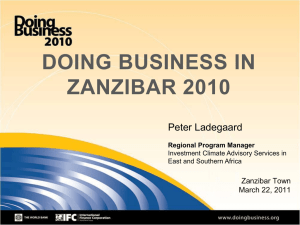
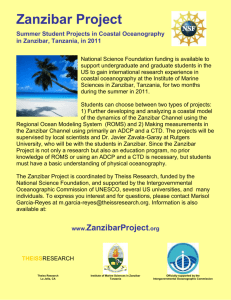
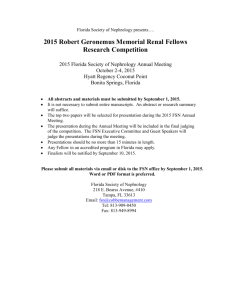
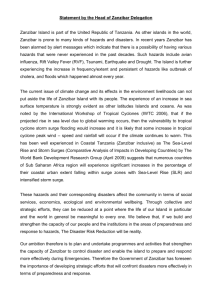
![Social protection agenda in Zanzibar [PPT]](http://s3.studylib.net/store/data/009285124_1-2f6289c99d1177ea8da43b975979159a-300x300.png)
